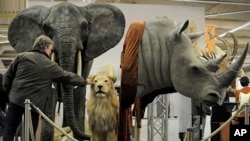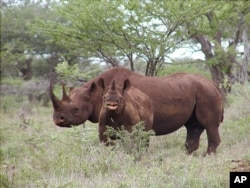Trophy hunting for big game is a controversial blood sport. Parts of an animal – such as the skin, horns or head – are kept as a trophy, with the carcass often used for food.
In some African countries, it is a legal and lucrative business. A 10-day "elephant package" could cost $36,000 and hunting a rhino could set you back a hefty $100,000. South Africa’s luxury tourism industry allows the hunting of elephants, rhino and other wildlife.
It is an emotionally charged issue. A 19-year-old college cheerleader from Texas provoked an uproar in July after posting pictures in which she posed with dead African wildlife she had legally hunted on a trip here.
The International Fund for Animal Welfare, an advocacy group based in Massachusetts, says in a Facebook post that the “needless killing of endangered species for trophies is inherently unsustainable, economically short-sighted, ecologically unsound and morally wrong.”
Generating funds
While many frown on the sport, some conservationists argue that trophy hunting generates crucial revenues needed for the conservation of Africa’s wildlife, including big game.
Tourism and donations do not come close to covering the billions of dollars needed, says zoologist John Hanks, former head of the World Wildlife Fund’s South Africa chapter.
“I think trophy hunting in South Africa is absolutely essential if we are going to look for long-term future for rhinos in the whole of Africa,” Hanks said. “… There’s hardly a single country anywhere that can afford to run its national parks as they should be run. … Here we are in South Africa, one of the richest countries in the continent, Kruger Park has a million visitors a year and [it] still cannot afford to defend the rhinos.”
Around 9,000 trophy hunters travel to South Africa annually – 90 percent of them from the United States. In 2012, foreign hunters spent $115 million in South Africa, where the hunting industry as a whole brings in more than $744 million annually and employs 70,000 people. It is the single most lucrative form of commercial land use.
Making an economic case
Herman Meyeridricks, president of the Professional Hunters Association of South Africa, contends legal hunting is crucial to protecting wildlife.
“The only way there will be incentive for those landowners to protect and keep on investing in rhino is if they have an economic value,” said Meyeridricks. “They can only have an economic value if there is an end-user that is willing to pay for that and that is the trophy hunter.”
Permits would not be awarded to hunters if the animals were genuinely threatened, Meyeridricks said, adding the number of those killed is “insignificant” to what is available.
The London-based advocacy group Save the Rhino counts just over 5,000 black rhinos and more than 20,400 white rhinos in Africa. More than 80 percent of the continent’s rhinos are in South Africa, National Geographic reports. The nations of Namibia and South Africa can sell five permits a year to hunters of adult black male rhinos, according to Conservation magazine.
The Convention on International Trade in Endangered Species, or CITES, controls the number of animals allowed to be killed legally. Critics say the oversight body is flawed, because it leaves monitoring quotas to individual governments.
Hunting as conservation tool
Susie Offord, Save the Rhino’s deputy director, maintains trophy hunting is a useful conservation tool if managed properly.
“In an ideal world, rhinos wouldn't be under the extreme pressure they are facing today and there wouldn't be any need for trophy hunting,” Offord said. “But the reality is that wildlife conservation is incredibly expensive.”
Not every country in Africa has followed suit. Kenya has had a long-standing policy against trophy hunting. When banning it in 1977 the Kenyan government described it as “a barbaric relic of colonialism.”
Criminal networks, coined as pseudo-hunters, also have exploited trophy hunting to launder horns. They command high prices on the black market in countries such as Vietnam and Thailand.
South African officials say there have been an estimated 300 instances of rhino horn exports by pseudo-hunters since 2009. Since then, the country has stopped issuing hunting permits to nationals from the Czech Republic and Vietnam.
Conservationists such as Offord say governments need to do more to fight criminality and reinforce hunting regulations.
Poaching and illegal trade “does need to be taken more seriously by governments; it needs a lot more action,” she said, calling for “a lot more cross-border collaboration.”





